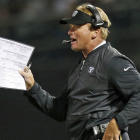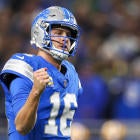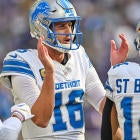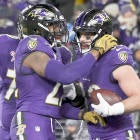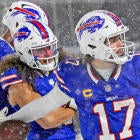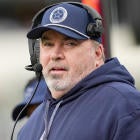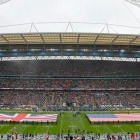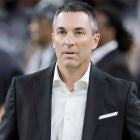The first Monday night of the 2018 NFL season features two games. In the early slate, we've got the Detroit Lions and the New York Jets, but in the late game, we've got the upstart Los Angeles Rams paying a visit to Jon Gruden and the Oakland Raiders (10:15 p.m., ESPN, ESPN2).
LA and Oakland were two of the busiest teams in the NFL this offseason, with the Rams going on the league's biggest shopping spree and the Raiders handing Gruden $100 million to leave the announcer's booth and return to the sideline. Once they get on the field, however, it seems fairly clear that one of these teams has a major advantage over the other in almost every area of the game.
Let's walk through exactly why the Rams seem so likely to take the Raiders to school on Monday night.
When the Raiders have the ball
The Rams had one of the NFL's best defenses last season, ranking 12th in points allowed (seventh in points allowed per drive) and sixth in defensive efficiency, as determined by Football Outsiders' defensive DVOA. They then went out and added more defensive talent than anybody in the league this offseason.
First came a trade for star Chiefs cornerback Marcus Peters, who has more interceptions than any player in the NFL since he entered the league. They followed that up with a deal for former Broncos cornerback Aqib Talib, who has been one of the best defensive backs in the league for years. And after he was cut loose by the Dolphins, the Rams then brought in Ndamukong Suh, giving them the best interior defensive line duo in the NFL now that Suh is paired with Aaron Donald in the middle of Wade Phillips' defense.
In other words, it is going to be unbelievably difficult to move the ball and/or score points against the 2018 Los Angeles Rams.
The Rams already had one of the NFL's best pass defenses, as Phillips' unit ranked 12th in yards allowed per attempt, fifth in opponents passer rating, and third in pass defensive DVOA in 2017. They were strong against the pass in every area: 12th in DVOA against No. 1 receivers, fourth against No. 2 receivers, seventh against all other receivers, 19th against tight ends, and ninth against running backs. They were 11th on passes to the left side, fourth on passes to the middle and fifth on passes to the right; fifth against deep passes and ninth against short passes. They essentially had zero weaknesses. And now they have upgrade in a big way at three of the most important positions on defense. It stands to reason that they'll be even more difficult to throw against in 2018.
And because of the additions of Peters and Talib, they'll be able to trust their cornerbacks on an island even more often. That will allow Phillips to drop an extra defender into the box more often, improving the team's run defense. And considering Suh is a wrecker against the run in his own right, he should have a strong impact on the team's ability to stop the run as well.
This is what the Raiders will be up against in Week 1. It's difficult to see them having all that much success, but if they do, it will likely be because the offensive line won the battle in the trenches.
The group up front for Oakland includes rookie Kolton Miller at left tackle, Kelechi Osemele at left guard, Rodney Hudson at center, Gabe Jackson at right guard, and Donald Penn at right tackle. That's most of the core group of maulers that made Derek Carr one of the most well-protected quarterbacks in the league over the past couple seasons, plus an early first-round pick for whom the team obviously has high hopes. The guys with the most work cut out for them are obviously Osemele, Hudson, and Jackson, who will have to collectively deal with the terror that is Donald and Suh, plus Michael Brockers.
Donald is coming off another monster season during which he led the NFL in total pressures despite missing two games. Suh has routinely seen and beaten double teams since the moment he stepped on the field. And Brockers gets extremely underrated because he's happened to play on the same team as the NFL's best interior defender for the past few years. It'll be important for that group of linemen up the middle to set the pocket for Carr, who is one of the league's most skittish quarterbacks when he has defenders anywhere near his feet. (This has been his biggest issue going back to college.)
While it may seem like Carr is well-equipped to deal with an elite pass rush and elite defensive backfield based on his reputation, it's become fairly clear that his reputation outstrips his actual on-field performance and abilities. Consider that among the 40 quarterbacks who have thrown at least 500 passes during Carr's time in the league, he ranks 27th in completion percentage, 20th in touchdown rate, 25th in passer rating, and 37th in yards per attempt.
It would be one thing if he had an elite pass-catching corps, a dominant run game, and/or an offensive genius scheming him into position for success. But Carr's best pass-catcher is Amari Cooper, who has struggled with drops and is coming off a dreadful season. His No. 2 wideout is Jordy Nelson, who the Packers felt they didn't need anymore. His slot man is Seth Roberts, who you may or may not be first hearing of right now. His tight end Jared Cook is arguably the most inconsistent player in the league. Oakland's run game was extremely inconsistent last season, and the team ultimately finished just 14th in rush offense DVOA.
And while Jon Gruden has the reputation of an offensive mastermind, he has been out of the league for a decade and the teams for which he called plays during his first stint in the league had an average ranking of 15th in yards, 17th in points, and 16th in DVOA. In other words, his offenses have typically been pretty average. He has also expressed an interest in bringing football back to 1998, or trending in the exact opposite direction of what the most successful teams in the league have been doing. Contrarianism can work on occasion but Gruden appears to have an antiquated view of the kinds of things that drive success in the NFL right now. That does not bode well for his offense's chances against one of the NFL's best defenses
When the Rams have the ball
Of course, it's also true that around this time last year, we could have said a whole lot of negative things about the Rams' offense. LA was coming off a season during which it ranked dead last in the NFL in yards, points, and passing, rushing, and overall offensive DVOA. Sure, they hired a new coach in Sean McVay, but Jared Goff looked like a lost cause, Todd Gurley was coming off a sophomore slump, and their wide receiver corps included two castoffs from the Buffalo Bills and a third-round rookie from Eastern Washington.
Of course, we all know what happened next: the Rams made a miraculous turnaround and became one of the best offenses in football in 2017, leading the league in scoring and ranking sixth in overall offensive DVOA. Goff went from having arguably the worst season for any rookie quarterback in NFL history to throwing for 3,804 yards and 28 touchdowns against only seven interceptions, while leading the NFL in both yards per completion and adjusted net yards per attempt. He more than doubled his touchdown rate, and slashed both his interception rate and his sack rate (thanks, Andrew Whitworth) by more than half.
Gurley exploded, leading the NFL in yards from scrimmage, rushing touchdowns, and total scores. He had just one more carry in 2017 than in 2016, and yet he gained 420 more yards on the ground. He also saw his passing-game involvement increase for the third straight season, catching 64 passes for 788 yards and six touchdowns.
He and Goff combined to turn the Rams into one of the NFL's most explosive offenses. The team ranked first in the NFL in explosive runs, per Sharp Football Stats, and fifth in explosive passes. The Raiders defense, meanwhile, ranked ninth in explosive runs against, but 21st in explosive passes allowed. Sure, they added Rashaan Melvin and Dominique Rodgers-Cromartie to their defensive backfield this season, but 2017 first-rounder Gareon Conley is coming off a season during which he ranked dead last in the NFL in yards allowed per route run and Leon Hall is ancient and did not have much success defending the slot last season. Oh, and the Raiders traded their best defensive player last week, so it's extremely likely they'll experience a huge drop-off in pressure rate and they were already the 30th ranked pass defense by DVOA so ya know that's pretty bad you guys.
Oakland's pass defense was basically the opposite of LA's, in that everything was a weakness: the Raiders ranked 30th in DVOA against No. 1 receivers, 24th against No. 2s, 29th against all other wideouts, 16th against tight ends, and 27th against running backs. They ranked 19th on passes to the left side of the field, 27th on passes to the middle, and 31st on passes to the right; 32nd on deep passes and 23rd on short passes.
So this is a bad pass defense going against a strong offense loaded with weapons, with a good offensive line protecting an accurate quarterback who excels at pushing the ball downfield and has a diverse group of weapons to whom he can spread the ball. Cooper Kupp was an excellent slot option as a rookie, ranking 12th in the NFL in yards per route run and fourth in DVOA. Robert Woods ranked ninth and 21st in the same categories, and emerged as Goff's most consistent target on the outside. The team also added Brandin Cooks to replace Sammy Watkins, who was Goff's most inconsistent target last season and with whom he never gained much chemistry.
The Raiders figure to have even more trouble with the Rams' rushing attack, especially when you consider that Mack was also their best run defender and the Raiders already struggled to defend the run. They stuffed just 19 percent of opponent carries behind the line of scrimmage last season, 24th in the NFL. They also allowed opponents to convert 67 percent of their opportunities on third or fourth down with two or fewer yards to go, 22nd in the league. The Rams have a great offensive line and Todd Gurley, so, good luck, I guess.
Pick: Rams 31, Raiders 13








